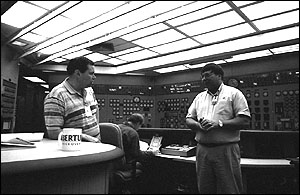By Stephen Smith
June 5, 1997

Night workers at Connecticut Yankee nuclear power plant are
helped through their shift by specially designed lighting.
WHEN WAS THE LAST TIME you pulled an "all-nighter?"
Not the last time you worked past midnight, but when you actually
stayed up from sundown to sunrise? Now think how lousy you probably
felt over the next couple days. For most of us, working all night
is a struggle against our own bodies. Unlike most other animals,
humans are biologically programmed to sleep when it's dark and
wake when it's light. We also appear to be alone among animals
in wanting to outwit the impulse to snooze. Scientists say that
most Americans, regardless of their work schedules, don't get
enough sleep. As Stephen Smith reports
in this documentary, scientists are trying to make it easier for
the growing number of people working nights.
Complete Feature Story
Listen to the entire twenty-six minute Working Nights documentary.
Feature Story in Six Parts

Working Nights, Stephen Smith
RealAudio 14.4, RealAudio 28.8
Listen to the Working Nights documentary in six parts, with transcripts.
Part 1 Staying sharp during the night shift is a problem for many workers. Don Banham, the night shift commander for the Minneapolis Police Department, spends each night driving the city from one end to the other. It's not always exciting.Part 2 The body's biological sleep timer, the circadian clock, explained.
Part 3 Harvard University researcher Charles Czeisler is studying the use of melatonin to shift the body's circadian rhythms.
Part 4 Night workers at the Connecticut Yankee nuclear power plant are helped through their shift by specially designed overhead lights that can shift their circadian clocks.
Part 5 At Stanford Univerity's Sleep Research Center physiologist Dale Edgar is studying how certain medications effect the circadian rhythms of lab rats, hoping to discover a drug to help humans shift their sleep patterns.
Part 6 On the road night and day with Myrna Patterson, a 30-year veteran truck driver. She takes short naps to get her through the long hauls. NASA is studying the napping habits of airline pilots in similar situations. (For more on the truck driving experience, see Scenes from the Road.)
Major support for the MPR Documentary Fund is provided by Phyllis Poehler, in memory of Walter Stremel.
"Working Nights" was written, produced and mixed by Stephen Smith of Minnesota Public Radio. Additional reporting by Stephanie Curtis. Production intern was Charles Maynes. The music was by Bill Frisell. This program is a production of Minnesota Public Radio, in collaboration with Soundprint, the weekly documentary series on public radio.
